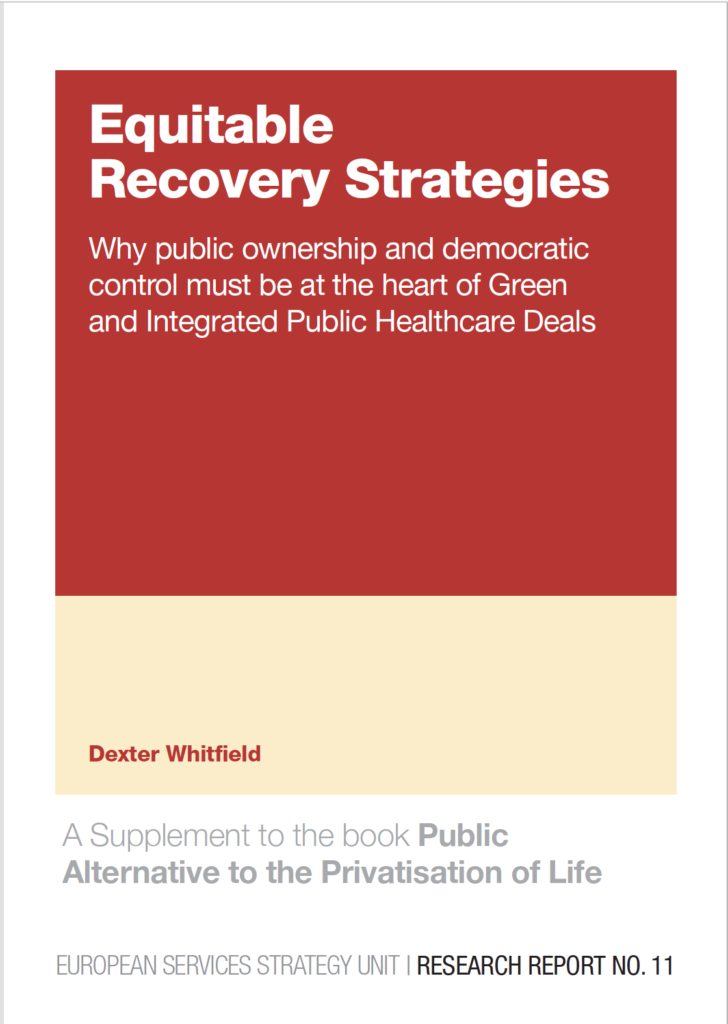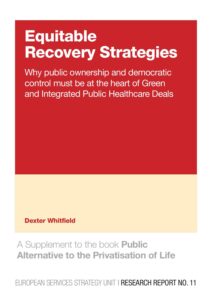New strategies for a post-pandemic economy – Markets and deals – Green Deals – Integrated Public Healthcare System Deals – ‘Just transition’ policies, jobs and quality of employment – Financing new economic policies, Green and Healthcare System deals – A new surge of privatisation – Strategic issues
Key findings
• There is a need for new economic strategies combining a Green Deal and an Integrated Public Healthcare System Deal.
• Globally, renewable energy projects are primarily owned and operated by private companies and private equity funds. Public finance is mainly used to attract private investment in renewable energy projects.
• A global secondary market operates with merger and acquisition deals that include renewable energy
manufacturers, project developers, project owners and renewable energy funds which seek to increase market share.

The renewable energy sector could ultimately mirror the private ownership and control of the fossil fuel sector but it will not be under democratic control and its equality, employment and social policies are likely to be business as usual.
• Green Deals must revert the commercialisation of nature and biodiversity, which should be treated as public goods with public protection and strong regulatory frameworks.
• Retrofitting housing is very important because heating and hot water for UK homes account for 25% of total energy use and 15.3% of greenhouse gas emissions in 2018. However, it is vital to draw on the lessons of earlier failed schemes, to recognise the complexity of retrofitting 27m public and private homes and the estimated £911bn (€1,007bn) cost.
• The Covid-19 pandemic has highlighted the urgent need to integrate public health, primary care, medical care and social care to create an Integrated Public Healthcare System.
• Equality and political, economic, social and environmental justice must be the core objective of public policy planning and management.
• Government and public authorities should develop a Conversion Strategy and should consist of a
national organisation or agency to develop alternative use proposals; identify international, national and regional demand for green products and services; provide technical support or grants to trade union and community organisations; develop national training and reskilling programmes for workers; and economic development programmes for areas affected by fossil fuel closures.
• A 16-part Code of Practice for Quality Employment is for a ‘just transition’ and must apply to all jobs in the economy.
• The economic consequences of the Covid-19 pandemic are still unfolding with a steep fall in GDP,
soaring rate of unemployment, rising levels of public and private debt and increasing budget deficits.
• Measures to increase revenue by £81.9bn (€90.5bn) per annum or £409.5bn (€452.5bn) over a five-year period would make a significant contribution towards addressing the cost of the Covid-19 pandemic in the UK and longer-term financing of new economic policies, Green and Public Healthcare Deals.
• Recovery strategies must establish certain parameters to include: no austerity measures; no tax increases for employees up to and including the average industrial wage; no privatisation and no reinvention of public private partnerships.
• The decarbonisation target will hopefully beachieved, but unless the decommodification of public services and adoption of radical public management is undertaken at the same time a new surge of privatisation would be preceded by further financialisation and marketisation with profound consequences for services and jobs.
• Key strategic issues are identified together with examples of organising, building alliances and alternative plans.


